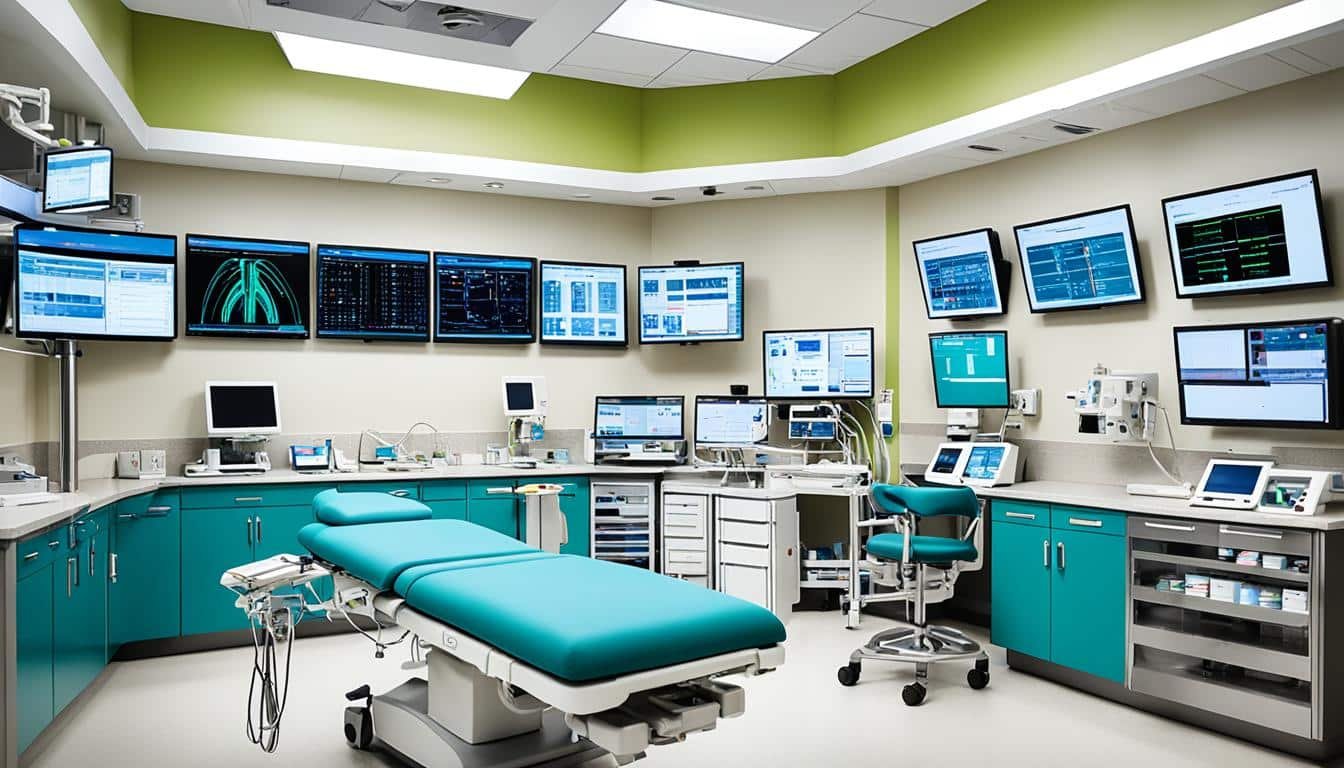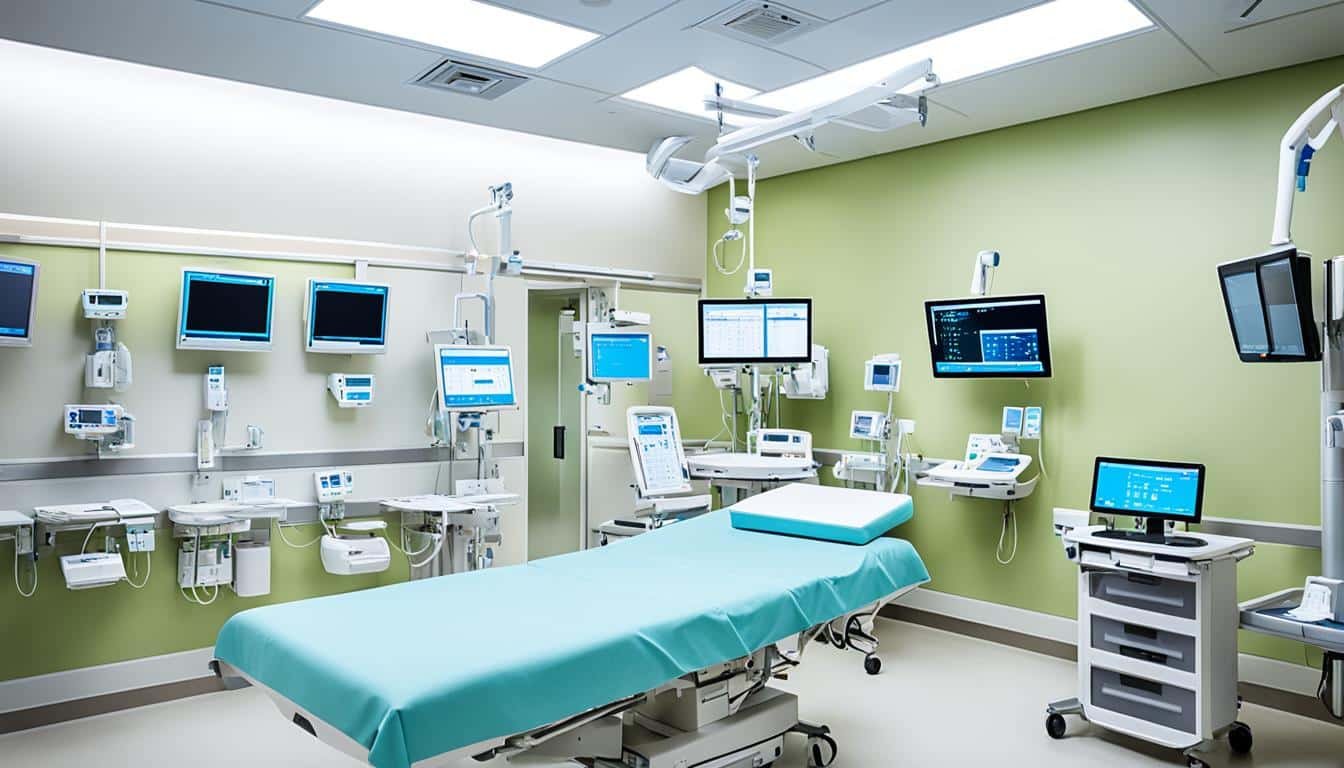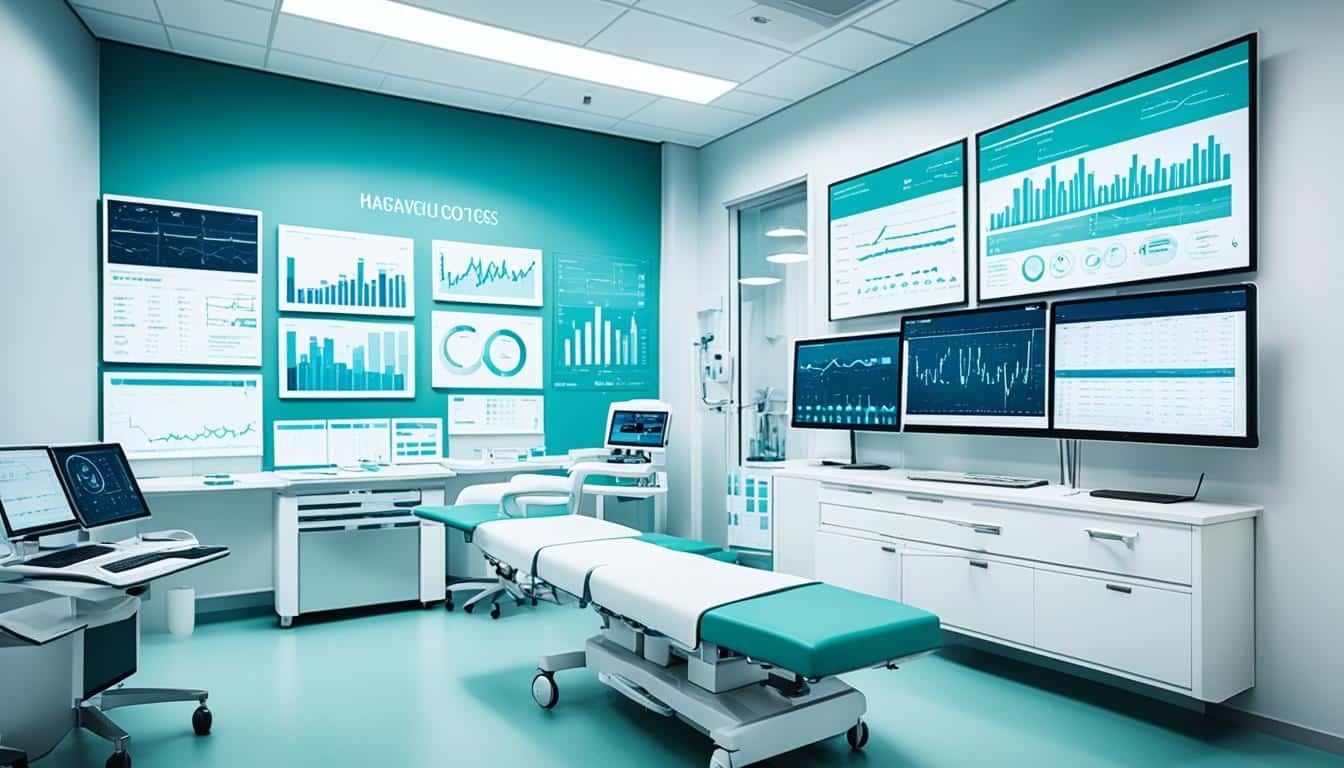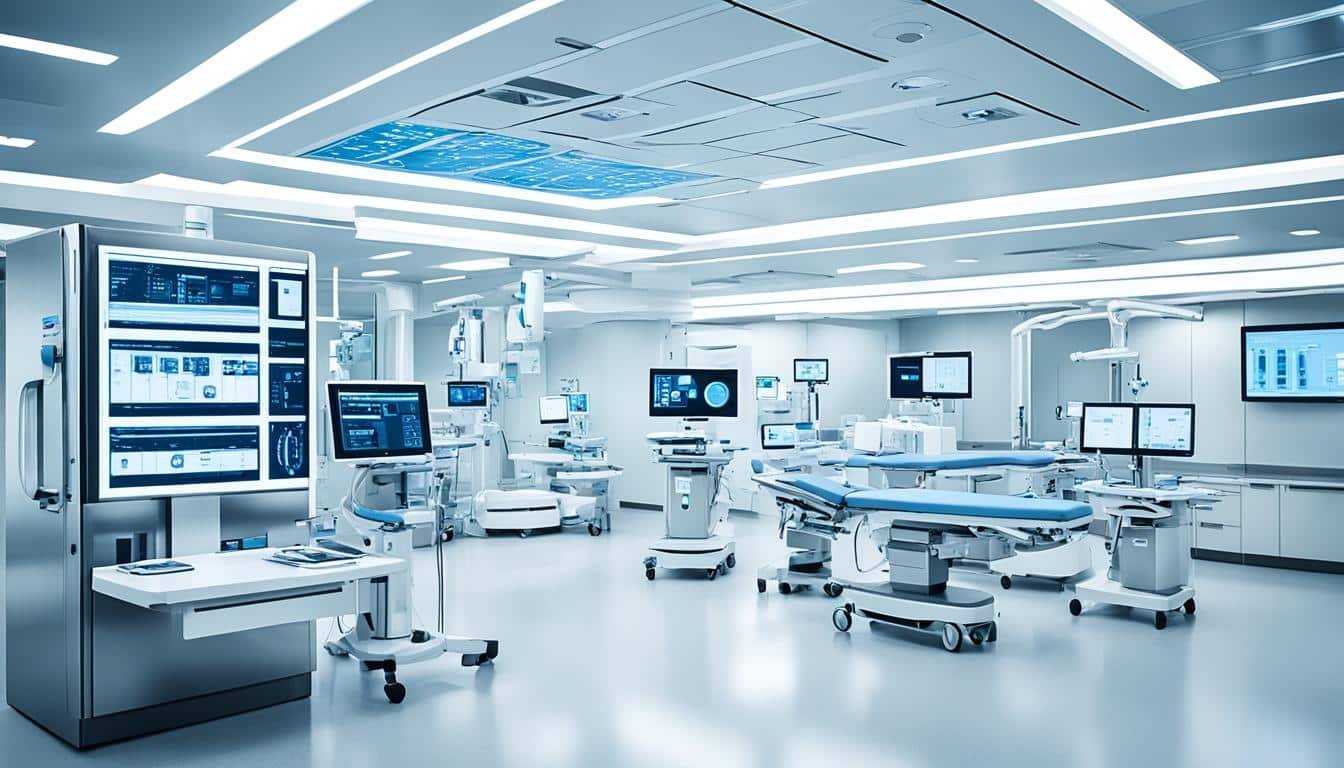Technology is key in hospital and healthcare management. It makes health care better, from finding diseases to managing them and talking to patients. Keeping records online cuts down on mistakes. Health apps help patients get better faster, and online doctor visits make care easier for those far away.
This tech helps make quicker, smarter health decisions. Hospitals that use technology see better patient care, lower costs, and happier staff. If you’re into healthcare management, getting an MBA can boost your career. There are also many courses to improve your skills.
Key Takeaways
- Technology is crucial for better patient care, improving health outcomes, and making hospitals run smoother.
- Using electronic health records and telemedicine changes the healthcare world by cutting down on mistakes and making care easier to get.
- Adopting technology in hospital management means better efficiency, lower costs, and smarter decisions.
- Healthcare management education, like an MBA or specific courses, can help professionals move up in this tech-focused field.
- Using technology well is key for hospital leaders to keep up with healthcare changes and give top-notch patient care.
Introduction to Technology in Hospital Management
The healthcare industry has changed a lot with technology. It helps improve patient care and makes hospitals run smoother. Technology is now key to managing hospitals today.
The Importance of Technology in Healthcare
Technology has changed how healthcare workers care for patients and run their places. Electronic health records (EHR) have changed how we handle patient data. This makes it easier to get and share important patient info.
This has made patients safer, cut down on mistakes, and helped doctors talk better with each other.
Benefits of Embracing Technology in Hospital Management
- Improved patient care and safety through data-driven decision-making
- Enhanced access to healthcare services, especially in remote areas, through telemedicine and remote patient monitoring
- Streamlined hospital operations and efficient supply chain management
- Reduced processing errors and improved record-keeping with electronic health records
- Better data management and analytics for informed decision-making
By using technology, hospital teams can get many benefits. These help improve patient care, make things run smoother, and lead to better outcomes for hospitals.
| Technology Adoption | Benefits |
|---|---|
| Electronic Health Records (EHR) | Improved patient data management, reduced errors, enhanced communication |
| Telemedicine and Remote Patient Monitoring | Increased healthcare access, especially in rural areas, improved patient engagement |
| Hospital Information Systems (HIS) | Streamlined operations, efficient supply chain management, data-driven decision-making |
Electronic Health Records (EHR) and Patient Data Management
The use of electronic health records (EHR) has changed healthcare a lot. These digital records help manage patient data and healthcare information in one place. This has changed how healthcare professionals and healthcare institutions handle records management.
EHRs make storing and finding patient information easy and up-to-date. This new way of managing healthcare data has many benefits. These include:
- Automatic alerts for follow-ups, appointments, check-ups, and diagnostic tests, improving patient care and outcomes.
- Centralized access to patient records, allowing for better coordination and collaboration among healthcare providers.
- Enhanced records management, reducing the risk of lost or misplaced physical files.
- Improved efficiency in hospital operations, from resource allocation to staff scheduling.
| Key Benefits of EHR | Impact on Healthcare |
|---|---|
| Improved data accessibility and organization | Enhanced patient care and outcomes |
| Streamlined communication and collaboration | Increased operational efficiency in hospitals |
| Reduced risk of lost or misplaced records | Better overall management of healthcare data |
By using electronic health records, healthcare groups can make the most of technology in hospital management. This changes how they handle patient data. It helps them give better care and run hospitals better.
Telemedicine and Remote Patient Monitoring

Telemedicine has changed the healthcare world, making it easier for patients to get care. It uses technology to let doctors check on patients from afar. This is a big help in rural and hard-to-reach areas.
Improving Access to Healthcare through Telemedicine
Telemedicine helps patients reach doctors even when they’re far away. With video calls and online tools, patients can talk to specialists without leaving home. This is great news for those living far from medical centers.
Remote patient monitoring takes telemedicine further. It uses devices to keep track of patients’ health signs and data. This is super useful for people with ongoing health issues or those in rural spots. It means they can get care without having to travel a lot.
| Benefit | Impact |
|---|---|
| Increased Access to Healthcare | Patients in remote and underserved communities can access top-quality care from the comfort of their homes. |
| Improved Patient Outcomes | Early detection and timely intervention through remote monitoring can lead to better health outcomes. |
| Cost Savings | Telemedicine can reduce the need for in-person visits, transportation, and hospitalization, leading to overall cost savings for the healthcare system and patients. |
| Enhanced Patient Satisfaction | Convenient and accessible telemedicine services can improve patient satisfaction and engagement with their healthcare providers. |
As healthcare changes, telemedicine and remote patient monitoring will be key. They’ll help make healthcare better and more accessible. This is especially true for people in rural areas and underserved communities.
Hospital Management

Roles and Responsibilities of Healthcare Managers
Healthcare managers are key to making hospitals and clinics run smoothly. They manage different departments and make sure staff and caregivers do their best. This helps keep patients happy and care quality high.
Healthcare administrators lead the team with a focus on big-picture planning. They make sure the organization’s goals, money, and actions work together. This helps improve healthcare services and patient results.
Healthcare managers are also in charge of checking out new tech for healthcare. They look at how new tech can make things better for patients, staff, and the hospital. This leads to happier patients and better goals for the organization.
| Roles of Healthcare Managers | Responsibilities of Healthcare Administrators |
|---|---|
|
|
Healthcare managers are vital in making hospital operations better. They help improve patient care, staff happiness, and the success of healthcare organizations.
Streamlining Hospital Operations with Technology

In today’s fast-paced healthcare world, managing hospital operations is complex. It involves patient flow, resource use, and supply chain management. But, hospital information systems (HIS) and technology have changed the game. They make hospitals run better, improve efficiency, and help manage resources and patient flow well.
Hospital Information Systems (HIS)
HIS are digital platforms that bring together many hospital tasks. They handle patient records, staff schedules, and resource use. This gives hospital managers a full view of their operations. They can spot areas to get better and make things more efficient.
With HIS, doctors can send prescriptions directly to pharmacies. They can also check drug interactions and lab results easily. This makes caring for patients smoother.
Supply Chain Management and Inventory Tracking
Technology has also changed how hospitals manage supply chain and track inventory. With inventory tracking systems, hospitals make sure they have the right supplies when they need them. This cuts down on waste and makes resource allocation better.
This leads to better patient flow and staff scheduling. Healthcare workers can focus on caring for patients instead of worrying about supplies.
| Benefits of Integrating Technology in Hospital Operations | Impact |
|---|---|
| Improved Efficiency | Streamlined processes, reduced waste, and optimized resource utilization |
| Enhanced Resource Management | Effective inventory tracking, supply chain optimization, and better allocation of staff and equipment |
| Optimized Patient Flow | Seamless patient intake, reduced waiting times, and improved patient experience |
| Informed Decision-Making | Data-driven insights for hospital managers to identify and address operational pain points |
By using technology and hospital information systems, healthcare groups can make their hospital operations smoother. This boosts efficiency and makes the patient experience better. As healthcare changes, technology will keep playing a key role in managing and improving hospital operations.
Patient Safety and Error Reduction through Technology

In the healthcare world, making sure patients are safe and cutting down on mistakes is key. Thanks to new tech, we’ve seen big steps forward. Using electronic health records (EHR) and computerized order systems has cut down on mistakes. This makes healthcare work better and safer.
Now, mistakes with prescriptions are much less common thanks to digital prescriptions. Tech helps spot and fix mistakes in diagnosing, which helps patients get better care. This tech change is making healthcare safer, letting doctors focus on giving great care to patients.
| Technology | Impact on Patient Safety |
|---|---|
| Electronic Health Records (EHR) | Reduces processing errors and improves record-keeping |
| Computerized Order Entry | Minimizes prescription errors and enhances order accuracy |
| Digital Prescriptions | Eliminates handwriting errors and provides real-time alerts |
| Diagnostic Error Identification | Assists healthcare providers in making informed decisions |
The integration of technology in healthcare management continues to revolutionize safety in healthcare, enhancing patient outcomes and the overall quality of care.
“Technology has become a vital component in ensuring patient safety and reducing medical errors in healthcare. Its capabilities continue to transform the industry, improving the lives of patients and healthcare providers alike.”
Healthcare Analytics and Data-Driven Decision Making

In today’s fast-paced hospital management, healthcare analytics and data-driven decisions are key. They use patient data from electronic health records and remote monitoring to help doctors and nurses. This leads to better patient care and smoother hospital operations.
Predictive Analytics in Healthcare
Predictive analytics in healthcare is more than just looking at past data. It uses smart algorithms and learning from data to spot trends and predict what might happen next. This lets healthcare teams act early to prevent problems, making patients safer and improving care.
Here are some ways predictive analytics helps in healthcare:
- Identifying high-risk patients and taking steps to prevent bad outcomes
- Forecasting disease outbreaks to prepare and lessen their effects
- Planning how to use resources and staff better for efficiency
- Guessing how many patients will come in to make sure there’s enough room and staff
By using patient data and predictive analytics, healthcare groups can make smarter decisions. This leads to better care for patients and better running of hospitals.
| Benefit | Description |
|---|---|
| Improved Patient Outcomes | Predictive analytics helps spot high-risk patients and prevent bad events, leading to better care and fewer complications. |
| Enhanced Operational Efficiency | It makes sure resources and staff are used well, improving how smoothly things run and cutting costs. |
| Disease Prevention and Early Intervention | By predicting outbreaks, healthcare teams can prepare and stop diseases from spreading, helping patients and communities. |
“Healthcare analytics and data-driven decision making are changing how hospitals and clinics work. This leads to better care for patients and more efficient operations.”
Emerging Technologies in Hospital Management
The healthcare industry is changing fast, and new technologies are key in hospital management. Artificial Intelligence (AI) and the Internet of Things (IoT) are leading the way.
Artificial Intelligence (AI) and Machine Learning
AI is changing how hospitals handle patient data and make decisions. It looks through lots of patient records to suggest the right diagnoses and treatment plans. This helps doctors give better care.
AI also spots patterns in test results. This helps doctors know the best steps to take for better patient results.
Internet of Things (IoT) in Healthcare
IoT is changing hospitals by linking medical devices and infrastructure. It helps collect and analyze patient data. This lets doctors keep an eye on patients from afar.
IoT also makes hospital supply chains better and helps with making decisions. This leads to better care and efficiency.
| Emerging Technology | Benefits in Hospital Management |
|---|---|
| Artificial Intelligence (AI) |
|
| Internet of Things (IoT) |
|
Hospitals using these new technologies will see big improvements. They’ll get better patient care, work more efficiently, and manage better.
Challenges and Ethical Considerations

The healthcare industry is using more technology in managing hospitals. This brings up many challenges and ethical issues. Keeping patient information and electronic health records safe is very important. Hospitals must follow healthcare regulations and protect against cybersecurity threats to keep patients’ trust.
Healthcare managers face big ethical and tech challenges. They need to balance new tech with keeping patient data safe. This means using strong data privacy steps like encryption and controlling who can see the data.
Healthcare groups also need to watch out for cybersecurity dangers like malware and phishing. They should invest in good cybersecurity tools and train their staff. This helps keep electronic health records safe.
Using technology in hospitals brings big chances and big ethical considerations. Leaders in healthcare must deal with these issues to use technology well. They need to keep high standards of data privacy and security to help their patients and communities.
The Future of Hospital Management and Technology Integration

Healthcare systems are working hard to give patients the best care possible. The future of hospital management will be shaped by advanced technology. Technologies like artificial intelligence (AI), the Internet of Things (IoT), telemedicine, and data analytics will change healthcare. They will make care better, more efficient, and cheaper pursue graduate ceo doctorate healthcare staff hospital ceo.
Healthcare managers will be key in bringing these new technologies into hospitals. They will make operations smoother, help staff work better, and give care that’s more tailored to each patient. As technology changes fast, hospitals that quickly adopt new ideas will do well.
AI and machine learning can automate tasks, make sure there are enough staff, and predict and solve problems. IoT devices and telemedicine can make patients more involved in their care, make getting care easier, and let doctors monitor patients from afar. This makes the patient’s experience better.
By using these new technologies, healthcare managers can make hospitals run better, save money, and keep staff happy. They can focus on giving top-notch, patient-focused care. The key to success in hospital management is using technology well.
“The future of hospital management lies in the seamless integration of cutting-edge technologies that empower healthcare providers to deliver exceptional, personalized care.”
Also Read : How Do Infectious Diseases Spread Among Populations?
Conclusion
Technology has changed how hospitals and healthcare work. It brings new ways to help patients, make things run smoother, and save money. Tools like electronic health records, telemedicine, AI, and IoT are making a big difference.
These technologies help healthcare workers manage patient data better. They cut down on mistakes and make patients healthier. For example, telemedicine brings doctors to people who can’t easily get to them. AI helps make smart choices to use resources well and keep patients safe.
But, using technology comes with its own set of problems. Healthcare groups need to think about keeping patient data safe and following the rules. It’s important to find a balance. This way, technology can help without hurting patient trust or putting sensitive info at risk.
The future of hospitals is all about technology getting better. Leaders who use new tools wisely will be ahead. They’ll give better care, work more efficiently, and succeed in the changing healthcare world.
FAQs
Q: What is the role of technology in healthcare management?
A: Technology plays a crucial role in healthcare management by streamlining processes, improving efficiency, enhancing patient care, and facilitating decision-making.
Q: How does technology impact financial management in hospitals?
A: Technology helps in financial management by providing tools for budgeting, forecasting, tracking expenses, and optimizing revenue cycles in hospital settings.
Q: What are the leadership roles in hospital administration that rely on technology?
A: Leadership roles such as hospital administrators, CEOs, and executives leverage technology for strategic planning, resource allocation, and overseeing operations in healthcare organizations.
Q: How can technology assist in managing compliance and regulatory requirements in healthcare?
A: Technology enables healthcare professionals to navigate complex compliance standards, ensure adherence to regulations, and maintain accurate health information for audits and evaluations.
Q: What are the benefits of using management software in hospital settings?
A: Management software helps hospital staff in administrative tasks, financial planning, patient care coordination, and facilitating communication among healthcare teams for efficient operations.
Q: How can technology improve the quality of healthcare services provided in hospitals?
A: Technology enhances patient care by facilitating accurate diagnoses, efficient treatment plans, secure health information sharing, and enhancing communication between healthcare providers and patients.
Q: What role does information technology play in hospital financial management?
A: Information technology enables hospital financial management through tools for billing, coding, revenue cycle management, financial analytics, and ensuring financial compliance in healthcare finance.
Source Links
- https://online.maryville.edu/online-bachelors-degrees/healthcare-management/resources/what-is/
- https://www.ncbi.nlm.nih.gov/pmc/articles/PMC4147743/
- https://timespro.com/blog/the-role-of-technology-in-healthcare-management




